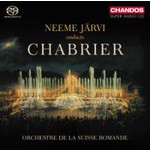
Neeme Järvi conducts Emmanuel Chabrier
 $40.00
Out of Stock
$40.00
Out of Stock6+ weeks add to cart
EMMANUEL CHABRIER
Neeme Järvi conducts Emmanuel Chabrier
Orchestre de la Suisse Romande, Neeme Järvi
[ Chandos SACD / Hybrid SACD ]
Release Date: Friday 19 July 2013
This item is currently out of stock. It may take 6 or more weeks to obtain from when you place your order as this is a specialist product.
This disc of popular works by Emmanuel Chabrier marks the beginning of a new series of French repertoire, performed by the Orchestre de la Suisse Romande under its newly appointed Artistic Director, Neeme Järvi.
After three attempts at comic opera, Chabrier finally achieved success in 1877 with L'Étoile, the plotline of which is set in the court of the somewhat emotionally unstable King Ouf. A couple of years previously, Chabrier had written a short Lamento for orchestra, a work which would not perhaps be considered revolutionary by today's audiences, but which caused the committee of the Société nationale de musique to hum and haw over it for eighteen long months before finally letting it loose on the Parisian public in 1878.
From July to December 1882, Chabrier took his family on an extended holiday to Spain, during which he kept himself busy by noting down the Spanish folk tunes and dance rhythms he encountered on his way. He put many of them into his orchestral masterpiece España, a work overwhelming in its orchestral colour, which is such a characteristic feature of this composer. The impressions of his Spanish holiday can also be heard in the Habanera.
For six years Chabrier worked on Gwendoline, a two-act dramatic opera on a libretto by Catulle Mendès, set in Britain in what he called 'barbarous times'. Inspired by Wagner and Berlioz, the Overture sets the scene perfectly for a drama of violence, treachery, and passion. A month after Gwendoline was premiered in Brussels in April 1886 the Opéra-Comique in Paris agreed to put on Chabrier's next opera, Le Roi malgré lui, a melting pot of complex political intrigue, cheerful arias, and vivacious dances.
In 1880 Chabrier had written his Dix Pièces pittoresques for piano, and over the next few years he orchestrated four of them to form the Suite pastorale, with its gently pulsing 'Idylle' movement (which inspired Poulenc to become a composer), the raucous 'Danse villageoise', the sultry 'Sous-bois', and last but not least the sunny, high-spirited 'Scherzo-valse'.
"the unifying feeling [is] the sheer joy, craftsmanship and radiance that Chabrier's music possesses and which these performances encapsulate so ear-catchingly." (Gramophone)
"This recording has the edge not only in being generously filled, but in bringing forth Järvi's good interpretations and velvety orchestral response. Estonian Järvi is very much at home in the field of romantic music and throughout conducts with verve. The Suisse Romande respond with an inclusive warmth." (MusicWeb July 2013)
"This will lift the spirits...The brass of the Orchestre de la Suisse Romande are full of verve, nicely crisp yet harrumphing when needed, while the woodwind are markedly less acidic than in years gone by. In Jarvi's hands, Espana seemingly dances on air in a whirl of colours." BBC Music Magazine Orchestral Choice, September 2013 *****
Tracks:
Gwendoline Overture
L'Etoile: Overture
L'Étoile: Two Entre'actes
Lamento
España
Habanera
Danse Slave
Fête Polonaise
Joyeuse Marche
Suite Pastorale
Bourrée Fantasque

